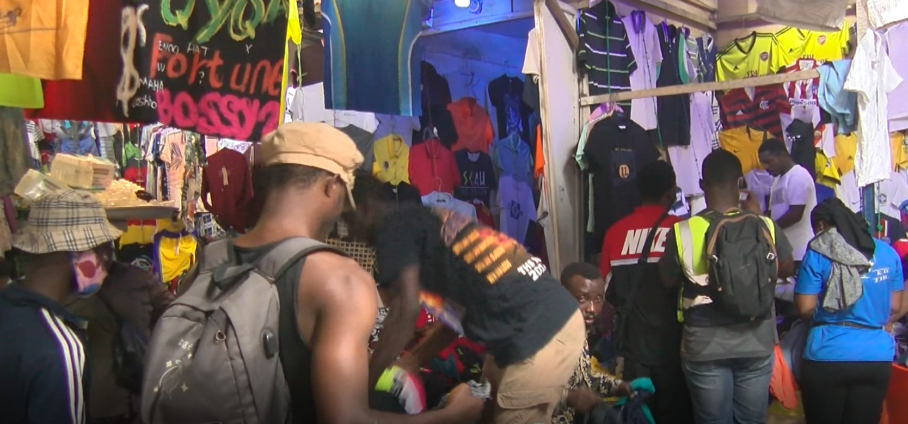A second-hand clothes dealer at Kantamanto, Antoinette, is considering quitting her business due to the continuous depreciation of the cedi, which is taking a toll on her business.
Currently, a dollar is almost GH₵7. The situation she said has resulted in difficulty in getting goods at a reasonable price because the price of a bale of clothes has shot up as a result of the continuous depreciation of the cedi.
Speaking to JoyNews on the Living Standard Series, she noted that the situation is threatening her livelihood.
“Things aren’t going well at all. We are in difficult times. These days we do not even get goods. Even the hand-to-mouth has forfeited us.
"My cash is even finished. Right now, I need about GH₵1000 to inject into my business. Those days, I could save and feed my children but now it has gotten so bad that I cannot even save,” she lamented.
Antoinette, a single parent of two children said she finds it challenging to make ends meet.
“I could spend between GH₵50 and GH₵100 cedi a day but now I’m not even able to make a profit. Everything is expensive. Times are really hard, things have gotten so bad even water to drink is expensive. When you buy light, it doesn’t even keep long,” she added.
Another jeans seller bemoaned the increase in the price of a bale of jeans due to the cedi depreciating in its value.
”First it [price of a bale of jeans] was GH₵4000 now it’s GH₵4400. GH₵400 has been added to the bale of 100 pieces of jeans,” he told Maame Esi Thompson on the Living Standard Series.
Becoming extra aggressive in getting customers is the order of the day for these second-hand clothes dealers.
Even those who buy bales of clothing have had to rethink strategies for doing business because prices have unduly shot up due to the dip in the value of the cedi.
Meanwhile, Associate Professor of Economics at the University of Ghana, Prof. Ebo Turkson, has emphasised the need for sustained effort to increase exports and reduce imports in government’s quest to check the depreciation of the cedi.
He said this will significantly reduce the volatility of the exchange rate between the cedi and the major foreign currencies.
“No matter how well the economy is doing and the Central Bank has resources to sustain the currency, we need to come to a realisation that the more we are import-oriented, the likelihood that we are going to face some of these problems. Depreciation is high because our ability to cushion it is limited,” he spoke on the Super Morning Show on Tuesday.
JoyNews’ Living Standard Series
In an all-new show, the Living Standard Series, JoyNews is set to tell the stories of how the average Ghanaian is surviving in recent times after the ravaging impact of the Covid-19 pandemic on the economy.
People continue to be negatively affected by the harsh economic climate and skyrocketing inflation on food and goods.
Latest Stories
-
GoldBod to transact only at Interbank Forex Rates – Sammy Gyamfi
6 minutes -
KNUST attracts and partners over 40 industry giants in hold career fair
18 minutes -
GWL to interrupt water supply in north-eastern Accra on Friday
20 minutes -
Struggling with sex in marriage? Uncle Ebo Whyte offers practical solutions
36 minutes -
Is Hon. Johnson Kwadwo Asiedu Nketia the General who knows the Battlefield?
1 hour -
Burna Boy makes Executive Producing Debut with Pan‑African Thriller “3 Cold Dishes”
1 hour -
UPSA condemns staff misconduct in viral altercation with student
1 hour -
Mahama demands strong and independent judiciary
1 hour -
Medical facilities in Ahafo Region hail NHIA for prompt payment of claims
2 hours -
Legendary Nigerian goalkeeper Peter Rufai passes away
2 hours -
Mahama urges judiciary to align justice with people’s needs
2 hours -
West African cities embrace risk-informed planning in new urban resilience workshop series
2 hours -
Everybody needs a good Nigerian friend – Lucy Quist
3 hours -
EchoHouse crowned Media Agency of The Year at 17th AAG Gong Gong Awards
3 hours -
History will judge how fairly you dispense justice, Mahama tells new justices
3 hours

